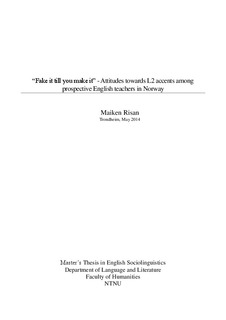| dc.description.abstract | This study investigates L2 accent attitudes among prospective English teachers in Norway. Greatly inspired by Jennifer Jenkins’ (2009a) predictions of a shift in non-native English language teaching “[…] away from its almost exclusive focus on native varieties of English” (10), the thesis focuses on the ambivalent relationship between the native speaker-ideal for pronunciation and the growing acceptance of international varieties of English. Based on results both from a questionnaire and in-depth interviews, the study explores prospective teachers’ attitudes towards their own English accent, attitudes towards accents used by teachers and learners in the classroom, and attitudes towards international varieties of English, emphasising Norwegian-influenced English.
The results demonstrate both ambivalent and contradicting attitudes among prospective teachers. At the heart of this ambivalence lies the tension between understanding and communication on the one hand, and the desire to sound native and hide the traces of the L1 on the other. The informants emphasise that L2 speakers do not need a perfect accent to communicate, but simultaneously express a strong preference for the British and American accents; not only for themselves, but also among teachers and learners in Norwegian classrooms. However, the participants express greater acceptance of Norwegian-influenced English among learners of English than among teachers, pointing towards Norwegian-influenced English as an imperfect accent, associated with learners at a lower level of proficiency.
The notion of native speaker ownership clearly persists in attitudes of prospective English teachers in Norway, dismissing claims of ELF that predicts a shift among expanding circle speakers towards viewing English language as rightfully their own. In contrast, results from this study indicate a view on English as the language of others; the English language belongs to the idealised native speaker. However, results demonstrate a careful shift in attitudes as teachers of tomorrow seem to express a desire to think differently about accents and uses of English but do the same – that is, emphasise understanding and communication in the classroom while encouraging a standard accent. | nb_NO |
